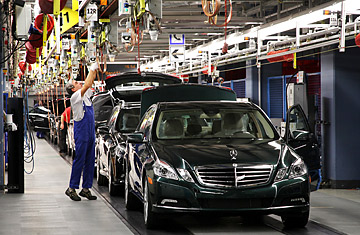
Daimler AG division Mercedes-Benz's production line in Stuttgart, Germany
(2 of 2)
Ramped-up FCPA prosecutions were actually started under the Bush Administration and grew out of post-Enron concerns about marketplace integrity, as well as a growing appreciation for how corruption torpedoes growth in developing countries. Even more focused on the link between corruption and underdevelopment, the Obama Administration has sharpened government sticks by forcing forfeiture of corrupt assets and targeting executives, several of whom are now serving prison time.
"This is a huge threat to American firms if they get caught in the crosshairs of enforcement authorities," says Kenneth Kurtz, CEO of the Steele Foundation, a risk-management firm. A recent survey by his firm found that only 10% of companies (with an average income of $250 million) had adequate compliance in place to protect against illegal sales deals. This inadequate level of preparation is a boon for compliance-service companies and defense lawyers, and both say companies are in for new headaches and higher costs as they scramble to stay out of the way of the new legal juggernaut.
That's particularly true because of the aggressive application of the law, which some critics say pushes the envelope on barely tested legal theories, and strains for the higher reaches of penalty-fine guidelines. One example: regarding employees of foreign state-owned companies as government officials, which holds them to stricter rules of engagement. That is the basis, in part or whole, for more than half of recent FCPA cases, says Mike Koehler, who worked on the FCPA for a decade at a law firm but now teaches at Butler University.
The government also has tremendous leverage over companies because self-disclosure is seen as the most effective way to mitigate punishment. That creates a veritable gravy train for the government, with cases served up on a silver platter by companies trying to lessen the penalties. "It's an upward spiral of a compliance-enforcement cycle: companies are establishing better compliance systems leading to more detection of wrongdoing, leading to more internal investigations and self-reporting, leading to more enforcement, which then cycles around to even more corporate compliance and investigations," says Paul McNulty, a senior Justice official under Bush who now leads global law firm Baker & McKenzie's FCPA practice. "Meanwhile, the penalties keep getting higher and higher."
Another leverage point is that companies can only contest charges in court if there is an indictment. "But what board of directors member, in this post–Arthur Andersen world, is going to allow their company to be indicted? Regardless of whatever the DOJ legal theory is, no matter how tenuous or dubious it is, it is simply easier, more cost-efficient, more practical to [settle]," says Koehler.
The result is that the vast majority of cases result in privately negotiated non- or deferred-prosecution agreements. Justice officials say their legal positions have all been vindicated so far and the flexibility they have to reach agreements aids the department's higher priority of getting compliance — not just imposing fines — and reforming company practices. "We take a broad vision of what our mission is in this area," says Mark Mendelsohn, a key Justice FCPA enforcer.
That broad mandate seems likely to have wide repercussions. One way to view the FCPA is as a kind of extension of the Sarbanes-Oxley Act, which tightened management's liability for inadequate internal controls. The FCPA now extends that exposure to dealings with overseas business partners. The more control management has over those partners, the more the liability. This is forcing companies to choose to provide overseas operations compliance training or put them further at arms length, explains Kurtz, who says one client company recently slashed its subsidiaries to just 11 from 100.
The good news for U.S. companies is that increasingly their overseas competitors are being held to higher standards, reflecting a growing global consensus that corruption is not only unethical, it's bad for business and for economies. That's the reason China and Brazil (less so India and even less so Russia) have been putting muscle into enforcing their own anticorruption laws, at least in their domestic markets.
If the U.S. really is committed to raising global standards again by leading a new campaign against global corruption, there will undoubtedly be more companies like Daimler AG that will learn the hard way that the rules of the game are really changing.
